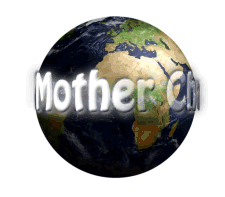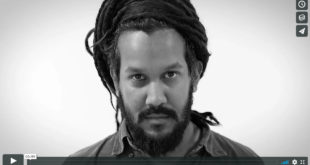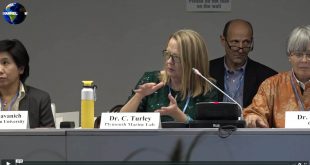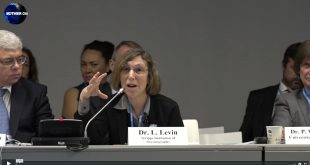Bianca Jagger
Founder and President
Bianca Jagger Human Rights Foundation
Panellists:
Sônia Guajajara
National Coordinator
Articulation of Indigenous Peoples of BrazilBenki Piyãko
Spiritual and political leader
Ashaninka community of the Amônia River, Brazil
Hindou Oumarou Ibrahim
Co-Chair
International Indigenous Peoples’ Forum on Climate Change
Reverend Fletcher Harper
Executive Director
GreenFaith
Indigenous Peoples and Climate Change: From Victims to Change Agents through Decent Work
The panel made some powerful statements regarding the exclusion of indigenous people from negotiations. To date indigenous people don’t have a seat at the negotiating tables at the UN Climate Change Conference. Although governments and international organisations have begun to take notice, most cannot even gain entrance to the high-level ‘Bula Zone.’ Their voices are not being heard. The panel called on world leaders and the UNFCCC to include indigenous people in negotiations and give them a seat at the table. Bianca Jagger joined them in their call.
As Sônia said, ‘if you are serious about protecting nature you need to speak to the people who are already doing the job.’ I couldn’t agree more. We need to hear from women and indigenous people, who both play a critical role in combating climate change.
The ILO released a report in April titled ‘Indigenous Peoples and Climate Change: From Victims to Change Agents through Decent Work.’ The title itself is telling. Perceptions are changing. Indigenous people who have previously been considered ‘victims’ are now being recognised as a powerful force in addressing climate change. This is also apparent from other talks held here at COP 23. The ILO calls for indigenous peoples to “be seen as powerful agents of change,” and accorded access to decent work opportunities and the ability to participate in the development of climate change measures.’
Indigenous people have long been proven to be the best custodians of biodiversity in their ancestral lands. They use the forests and natural resources sustainably. They are among the most vulnerable groups in terms of climate change – but they are a critical part of the solution.
Around 70 million indigenous peoples are dependent on forests to meet their livelihood needs. Indigenous people account for 5 percent of the world’s population, but care for and protect 22 percent of the Earth’s surface and 80 percent of the planet’s biodiversity.
In Latin America and Asia alone, indigenous peoples and local communities manage about one-third of all tropical forests. And the climate benefits from indigenous peoples’ action are high. The indigenous managed forests in just four tropical regions—the Amazon Basin, Mesoamerica, the Democratic Republic of Congo (DRC) and Indonesia—contain more than 20% of the world’s tropical forest carbon.
One positive development to come out of COP23 is the operationalisation of the Local Communities and Indigenous Peoples Platform. The Platform will provide a forum to exchange experiences and to share best practices on mitigation and adaptation, to give indigenous people an active role in shaping the climate policy. While the platform is welcome, it is only a small step in the right direction towards recognizing and respecting the perspectives and knowledge of indigenous peoples in the UN process.
Sonia Guajajara also criticized Amazonian governments’ extractivist economic model that prioritizes soy monocrops and mining, which become greenwashed as sustainable despite the major threat of deforestation.
“There are those who want more than they have, but in the end nothing will be left because Mother Earth cannot be exploited this much” said Benki Piyako
Hindou Oumarou Ibrahim speaking on the Paris Agreement, said: “I think it’s important all over the world, but especially for indigenous people because of our life. It’s giving us hope, but it’s just a beginning. Hope is not enough, we want to have actions. Then it will be more important for indigenous people, when we can see it’s changing our life. How it’s changing our identity, how it’s conserving all our food systems and ensuring the next generation of all indigenous peoples.”
She said “We are seeing the consequences of climate change, in my community, in 2 ways. In environmental damage we are seeing seasons change. We used to have 3 seasons: rain season, cold season and dry season. But most of the last years, we’ve shifted to 2 seasons. A very long dry season and very short rain season and the rain season is not normal. Either we have a lot of water inundation everywhere or we have just some water some weeks and then it’s dry in other places. So, it’s impacting the food security of people.”
“On the other side, it’s impacting our social life, the responsibilities of the people. The men’s responsibility to ensure security and food for his family is changing alot because he has to work so hard and has to leave our community to go in other towns and the women work. It’s giving them double work because they have to go far to collect water and food and they have to walk far to get medicine and ensure the security of the family because the men have left to find another job. So the impact is in all the life and survival of my people.” said Hindou.
She further stated “All the 17 SDG goals are important for indigenous peoples. Because we need peace and security. As indigenous peoples, we have conflict in our communities. We need zero hunger and food sovereignty. We need (to eradicate) the world number one, poverty: so, to increase our economy. All these goals are important because it’s going to lead us to a better life. But it can not be effective, if it’s not taking into account the needs of indigenous peoples. The design that we want to have. So those goals have to respect our needs, our rights and our participation through all the processes, to achieve the 17 goals. Otherwise, we can arrive very soon to 2030, then we can see the result. So we are playing a big role to achieve the SDGs, but we need to have our place to be here and our voice to be heard and our participation to be in all the processes from the beginning.”
By virtue of their unique and comprehensive traditional knowledge systems, indigenous peoples are at the forefront of understanding what climate change means for societies, ecosystems, and cultures, and how their resilience may be enhanced. Thus, providing indigenous peoples with a larger role in global climate action is crucial.
Traditional indigenous knowledge of the environment and weather patterns is passed down through many generations, and is crucial for monitoring and mitigating climate change impacts.
Examples abound of the resilience and adaptiveness of indigenous peoples using traditional knowledge to protect and enhance the natural environment and humans’ place within it. These practices are being refined and adapted to suit indigenous peoples’ needs in the face of climate change.
For instance, indigenous knowledge is being used in the Solomon Islands to enhance existing approaches to disaster risk reduction by contributing to the development of early warning systems and coping strategies.
In Nepal, a pilot project is using indigenous methods of seed storage as a basis for increasing resilience and improving the livelihoods of indigenous communities in the area, equipping farmers with the tools and knowledge to reduce loss and deterioration of seeds and increase local food security.
UNFCCC Designing Platform for Local Communities and Indigenous Peoples
In order to make this knowledge more accessible, and in order to increase the role of indigenous peoples and local communities in global climate action and support the inclusion of their knowledge systems in scaling up adaptation and resilience, the United Nations Climate Change (UNFCCC) Secretariat is setting up a new platform for local communities and indigenous peoples.
Established by the Paris Agreement, the platform will serve as a pivotal arena for advancing the engagement of indigenous peoples in the UNFCCC process.
The platform will seek to empower indigenous peoples, enhance the role of their knowledge systems, practices and innovations in global climate action, and help to uphold their right to the conservation and protection of the environment and land guaranteed in the UNDRIP.
The Adaptation Knowledge Portal under the Nairobi work programme already offers a wealth of resources on the use of indigenous traditional knowledge to promote climate adaptation and resilience, see here.
 Mother Channel Environmental, climate change news and media.
Mother Channel Environmental, climate change news and media.



